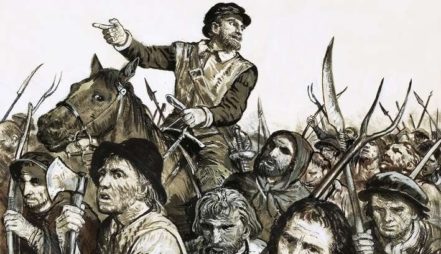
The Peasants’ Revolt
English village peasants – poor workers owned by rich landowners – had finally taken enough harsh treatment by 1381. The Peasants’ Revolt was the result.
Although many peasants had died from the Black Death, the survivors were forbidden by a new law to ask for higher wages. Instead, the landowners made more money from the scarcity value of their goods. Not only that, but the peasants were expected to pay a new ‘poll tax’ to help with the cost of the war against France. When the tax was tripled to cover a shortfall, there were riots, killings and arson attacks, and thousands of people marched to London to see the King.
The young King Richard II (1367-1400) faced them and agreed to their demands, but after they had gone home his army searched out hundreds of protesters and executed them. However, the Peasants’ Revolt was not in vain, as the cap on wages was later removed and the poll tax abolished. Peasants were also able to buy their freedom.
